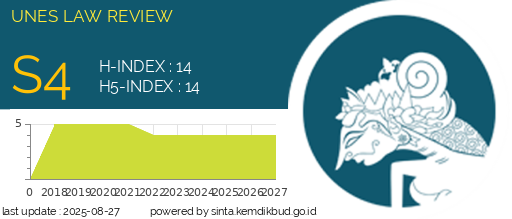TINJAUAN YURIDIS PEMBELAAN TERPAKSA (NOODWEER EXCESS) SEBAGAI DASAR PENGHAPUSAN PIDANA ANALISIS KASUS PELAKU BEGAL DI NTB YANG TERBUNUH OLEH KORBAN BEGAL AS
DOI:
https://doi.org/10.31933/unesrev.v5i4.685Keywords:
Beheading, Forced Defense, MurderAbstract
At this time, deviant behavior is widely found within society. Deviant behavior refers to actions that violate norms, rules, or laws in society. The research questions addressed in this study are: 1. What is the juridical perspective on perpetrators of robbery who are killed by victims due to self-defense (excessive self-defense)? 2. What is the legal certainty regarding self-defense (excessive self-defense) carried out by victims in response to robbery they experienced? The research method used in this Final Project is normative juridical research, which means that the issues raised, discussed, and elaborated in this study are focused on applying principles or norms within positive law. Excessive self-defense or exceeding the limits considered reasonable in self-defense occurs when someone goes beyond the boundaries deemed reasonable in a self-defense situation. In this case, although the robber may have initiated the attack or threatened the victim, the use of excessive force by the victim can raise questions about the legitimacy of their actions. In determining legal certainty in cases of self-defense, factors such as the force used, the level of threat to the victim, and the overall circumstances of the case will be examined by the court. Previous court decisions in similar cases or legal precedents can also influence legal certainty. Article 49, paragraph (1) of the Criminal Code highlights an important point, stating, "Defense against an attack or threat." Defense, in this context, must aim to stop actions or attacks deemed necessary at that moment. The defense must be proportionate to the encountered attack, and there must be no other means available to protect oneself except through self-defense.
Downloads
References
Ariman, H. R., & Raghib, F. (2016). Hukum Pidana. Malang: Setara Press.
Devita Cahyani, D. A., Laksmi Dewi, A. S., & Widyantara, I. M. (2019). Analisis Pembuktian Alasan Pembelaan Terpaksa Yang Melampaui Batas Dalam Tindak Pidana Yang Menyebabkan. Jurnal Analogi Hukum 1,150.
H., H. (2014). Studi Tentang Makna Penyimpangan Perilaku Di Kalangan Remaja. Junal Kriminologi, 9-18.
Hamzah, A. (1994). Asas - asas Hukum Pidana. Jakarta: Rineka Cipta.
Indonesia, C. (2022, April 14). Korban Begal Lombok Tengah Jadi Tersangka, Polda NTB Ambil Alih Kasus. Retrieved from CNN Indonesia: https://www.cnnindonesia.com/nasional/20220414170555-12-784962/korban-begal-lombok-tengah-jadi-tersangka-polda-ntb-ambil-alih-kasus
Kartono, & Kartini. (2010). Patologi Sosial 2, Kenakalan Remaja (Vol. 9). Jakarta: PT Raja Grafindo.
Krisna, L. A. (2016). Kajian Yuridis Terhadap Pembelaan Terpaksa Sebagai Alasan Penghapusan Penuntutan. Jurnal Hukum Samudra Keadilan 11, 123.
Lubis, F., & Siregar, A. S. (2020). Analisis Penghapusan Pidana Terhadap Perbuatan Menghilangkan Nyawa. Jurnal Retentum 1, 9-17.
Marselino, R. (2020). Pembelaan Terpaksa Yang Melampaui Batas (Noodweer Exces) Pada Pasal 49 ayat (2). Jurist Diction 3, 640.
Mertokusumo, S. (2007). Penemuan Hukum Sebuah Pengantar. Yogyakarta: Liberty.
P.A.F., L. (1984). Dasar-dasar Hukum Pidana Indonesia. Bandung: Sinar Baru.
Redaksi. (2015, maret 5). Pembegalan Adalah Pencurian Disertai Dengan Kekerasan. Retrieved from Pembegalan Adalah Pencurian Disertai Dengan Kekerasan: https://www.gresnews.com/berita/tips/96277-pembegalan-adalah-pencurian-disertai-dengan-kekerasan/
Soesilo, R. (1993). Kitab Undang-Undang Hukum Pidana serta Komentar-Komentar Lengkap. Jakarta: Politeia
Downloads
Published
How to Cite
Issue
Section
License
Hak cipta :
Penulis yang mempublikasikan manuskripnya di jurnal ini menyetujui ketentuan berikut:
- Hak cipta pada setiap artikel adalah milik penulis.
- Penulis mengakui bahwa UNES Law Review berhak menjadi yang pertama menerbitkan dengan lisensi Creative Commons Attribution 4.0 International (Attribution 4.0 International CC BY 4.0) .
- Penulis dapat mengirimkan artikel secara terpisah, mengatur distribusi non-eksklusif manuskrip yang telah diterbitkan dalam jurnal ini ke versi lain (misalnya, dikirim ke repositori institusi penulis, publikasi ke dalam buku, dll.), dengan mengakui bahwa manuskrip telah diterbitkan pertama kali di Jurnal UNES Law Review.



















